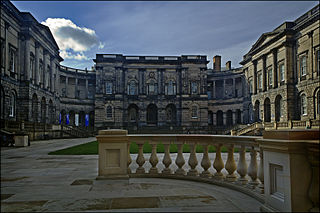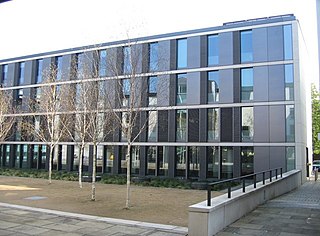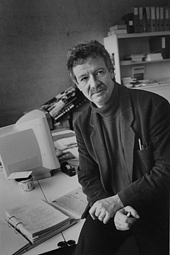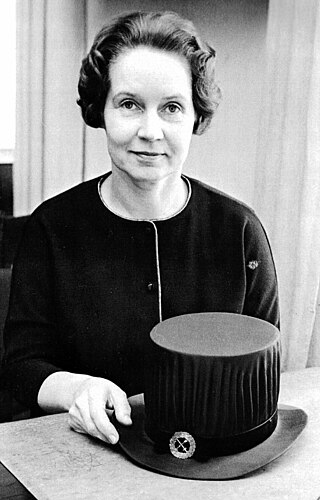Related Research Articles

Criminal justice is the delivery of justice to those who have been accused of committing crimes. The criminal justice system is a series of government agencies and institutions. Goals include the rehabilitation of offenders, preventing other crimes, and moral support for victims. The primary institutions of the criminal justice system are the police, prosecution and defense lawyers, the courts and the prisons system.

Juvenile delinquency, also known as juvenile offending, is the act of participating in unlawful behavior as a minor or individual younger than the statutory age of majority. The term delinquent usually refers to juvenile delinquency, and is also generalised to refer to a young person who behaves an unacceptable way.

Vivien Helen Stern, Baroness Stern is a crossbench member of the House of Lords.

Edinburgh Law School, founded in 1707, is a school within the University of Edinburgh, Scotland, United Kingdom dedicated to research and teaching in law. It is located in the historic Old College, the original site of the University. Two of the twelve currently sitting Supreme Court of the United Kingdom justices are graduates of Edinburgh, including the current President and Deputy President.

The Institute of Criminology is the criminological research institute within the Faculty of Law at the University of Cambridge. The institute is one of the oldest criminological research institutes in Europe, and has exerted a strong influence on the development of criminology. Its multidisciplinary teaching and research staff are recruited from the disciplines of law, psychiatry, psychology, and sociology. It is located on the Sidgwick Site in the west of Cambridge, England. The Institute of Criminology building was designed by Allies and Morrison. The institute is also home to the Radzinowicz Library, which houses the most comprehensive criminology collection in the United Kingdom. The institute has approximately 50 PhD students, 30-40 M.Phil. students, and 200 M.St students. The institute also offers courses to Cambridge undergraduates, particularly in law, but also in human social and political sciences and in psychology and behavioural sciences.
David S. Wall FRSA FAcSS is Professor of Criminology at the Centre for Criminal Justice Studies, School of Law, University of Leeds, England, where he researches and teaches cybercrime, policing, organised and transnational crime and intellectual property crime. He rejoined the University of Leeds in August 2015 from Durham University, where he was Professor of Criminology. Between 2011 and 2014 he was Head of the School of Applied Social Sciences (SASS). Before moving to Durham in 2010 he was Professor of Criminal Justice and Information Society at the University of Leeds, where he also held the position of Head of the School of Law (2005–2007) and Director of the Centre for Criminal Justice Studies (2000–2005). He is a Fellow of the Alan Turing Institute.

Lucia ZednerFBA is a British legal scholar. She is a professor of criminal justice at the University of Oxford and a senior fellow of All Souls College, Oxford.
David Garland is Arthur T. Vanderbilt Professor of Law and professor of sociology at New York University, and an honorary professor in Criminology at Edinburgh Law School. He is well known for his historical and sociological studies of penal institutions, for his work on the welfare state, and for his contributions to criminology, social theory, and the study of social control.
The Centre for Crime and Justice Studies (CCJS) is a charity based in the United Kingdom focusing on crime and the criminal justice system. It seeks to bring together people involved in criminal justice through various means, including publications, conferences, and courses.
Freda Adler is a criminologist and educator, currently serving as professor emeritus at Rutgers University and a visiting professor at the University of Pennsylvania. She was President of the American Society of Criminology in 1994-1995. She has acted as a consultant to the United Nations on criminal justice matters since 1975, holding various roles within United Nations organizations. A prolific writer, Adler has published in a variety of criminological areas, including female criminality, international issues in crime, piracy, drug abuse, and social control theories.

Criminology is the interdisciplinary study of crime and deviant behaviour. Criminology is a multidisciplinary field in both the behavioural and social sciences, which draws primarily upon the research of sociologists, political scientists, economists, legal sociologists, psychologists, philosophers, psychiatrists, social workers, biologists, social anthropologists, scholars of law and jurisprudence, as well as the processes that define administration of justice and the criminal justice system.
Professor Nigel Walker, CBE was Wolfson Professor of Criminology at King's College, Cambridge.

Christoph Martin Killias is a Swiss criminologist who has been a permanent visiting professor at the University of St. Gallen's law school since 2013. He is also the co-chair of the Campbell Collaboration's Crime and Justice Group.
Nicola Mary Lacey, is a British legal scholar who specialises in criminal law. Her research interests include criminal justice, criminal responsibility, and the political economy of punishment. Since 2013, she has been Professor of Law, Gender and Social Policy at the London School of Economics (LSE). She was previously Professor of Criminal Law and Legal Theory at LSE (1998–2010), and then Professor of Criminal Law and Legal Theory at the University of Oxford and a Senior Research Fellow of All Souls College, Oxford (2010–2013).
David Philip Farrington is a British criminologist, forensic psychologist, and emeritus professor of psychological criminology at the University of Cambridge, where he is also a Leverhulme Trust Emeritus Fellow. In 2014, Paul Hawkins and Bitna Kim wrote that Farrington "is considered one of the leading psychologists and main contributors to the field of criminology in recent years."

Karuppannan Jaishankar is the Founder and Principal Director and Professor of Criminology & Justice Sciences at the International Institute of Justice & Police Sciences Bengaluru, Karnataka, India.
Alison Liebling, is a British criminologist and academic. She has been Director of the Prisons Research Centre at the University of Cambridge since 2000, and Professor of Criminology and Criminal Justice since 2006.

Sylvi Inkeri Anttila was a Finnish jurist and criminologist who was the Minister of Justice of Finland during the caretaker government of Keijo Liinamaa in 1975. She studied criminal law at the University of Helsinki, becoming the first woman in Finland to receive a doctorate in law in 1946 and the first female professor of criminal law in Finland in 1961.
Lesley McMillan, FRSE, professor of Criminology and Sociology at Glasgow Caledonian University (GCU), associate director of the Scottish Institute for Policing Research, and associate director of the Centre for Research in Families and Relationships based at the University of Edinburgh, researches gender-based violence and criminal justice systems. She influenced reforms in police training for best practice when dealing with traumatised rape or sexual violence survivors, and was behind a multimedia campaign "Erase the Grey" which challenges traditional views on gender-based violence.
Lorna Anne Dawson CBE FRSE is professor and head of soil forensics at the James Hutton Institute, Scotland, who is an Expert witness, Chartered Scientist, and registered expert with the National Crime Agency. She won the award of Soil Forensic Expert Witness of the Year in the Corporate INTL 2021 Global Awards for her forensic research solving major criminal cases, including the World's End pub murders. She had won a special Pride of Britain Award by The Daily Mirror in 2017, for her role in solving long standing criminal cases, and her science communications. She is a Fellow of the Royal Society of Edinburgh, Commander of the Order of the British Empire, with international academic recognition.
References
- ↑ "Professor Lesley McAra | Edinburgh Law School". www.law.ed.ac.uk. Retrieved 30 July 2021.
- ↑ "Professor Lesley McAra CBE FRSE". The Royal Society of Edinburgh. 5 May 2021. Retrieved 30 July 2021.
- ↑ "Lesley McAra". The University of Edinburgh. Retrieved 30 July 2021.
- ↑ McAra, Lesley (1998). Parole board decision making. Great Britain. Scottish Office. Central Research Unit. Edinburgh: Stationery Office. ISBN 0-11-495874-2. OCLC 39863511.
- ↑ McAra, Lesley (2004). Truancy, school exclusion and substance misuse. University of Edinburgh. Centre for Law and Society. Edinburgh: University of Edinburgh, Centre for Law and Society. ISBN 0-905893-04-2. OCLC 56923547.
- ↑ Perspectives on punishment : the contours of control. Sarah Armstrong, Lesley McAra. Oxford: Oxford University Press. 2006. ISBN 0-19-927876-8. OCLC 69593931.
{{cite book}}: CS1 maint: others (link) - ↑ "Publications". | Edinburgh Study of Youth Transitions and Crime. Retrieved 30 July 2021.
- ↑ "SCCJR Prof Lesley McAra". SCCJR. Retrieved 30 July 2021.
- ↑ "The Executive Board of the European Society of Criminology". European Society of Criminology. Retrieved 24 May 2022.
- 1 2 "The Edinburgh Study of Youth Transitions and Crime". Nuffield Foundation. Retrieved 30 July 2021.
- ↑ McAra, Lesley; McVie, Susan (May 2010). "Youth crime and justice: Key messages from the Edinburgh Study of Youth Transitions and Crime". Criminology & Criminal Justice. 10 (2): 179–209. doi:10.1177/1748895809360971. hdl: 20.500.11820/6baf67fb-481f-4822-82ce-0167de1ec65a . ISSN 1748-8958. S2CID 143600871.
- ↑ "Scottish justice system 'punishes poorer people'". BBC News. 13 November 2015. Retrieved 30 July 2021.
- ↑ News, Scottish Legal. "Scotland's poorest 'most likely' to be victims of crime". Scottish Legal News. Retrieved 30 July 2021.
{{cite web}}:|last=has generic name (help) - ↑ "An uncomfortable truth- the strong link between poverty and crime". Transform Justice. 27 November 2015. Retrieved 30 July 2021.
- ↑ satkins (4 November 2020). "Data Comic: How Crime has Changed in Scotland". | Edinburgh Study of Youth Transitions and Crime. Retrieved 30 July 2021.